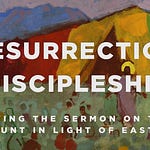Gracious God, as we turn to your Word for us, may the Spirit of God rest upon us. Help us to be steadfast in our hearing, in our speaking, in our believing, and in our living. Amen.

Strength and steadfastness for ministry, the pursuit of peace and holiness, and the Grace of God, all in four verses is why this section of Hebrews is one of my favorite parts of the Christian Bible. And, what I love most is that the author, in compelling their audience to be ready for ministry, to be ready for following the path laid before the Church by Christ, ends this section with the Grace of God.
“Lift up your drooping hands,” “strengthen your knees” and “make straight paths” to pursue peace with everyone and holiness so that no one misses out on the Grace of God. Be prepared for ministry because the Grace of God is so important, so precious, that no one should miss out on that which we have encountered and hold dear.
It is the Grace of God that binds the Church together, spanning geography and time, holding the Church together regardless of what we might say about our own fracturing.
Retired United Methodist Bishop and mentor of mine, Rev. Will Willimon wrote that the Grace of God is more than an “innocuous pat on the head as Jesus murmurs unctuously, ‘I love you just the way you are; promise me you won’t change a thing.’” Grace,” Will continues, “is how Christ, in the power of the Holy Spirit, appears to us and works for us and in us.”[i]
The Grace of God says that God loves you, right now, just as you are. But there is more. Once we have experienced the Grace of God, once we come to know the love of God is ours just as we are, whether we like it or not – through word, song, sacrament, and community – then we are changed from the inside out. And just like when Jesus was baptized by John in the Jordan River, and a sound echoed from Heaven saying, "This is Son, my beloved," the same is true of us. God calls each of our names and in doing so, names us as "beloved child.” Not because of the accolades favored by the world but simply because each of us, each of you was created in the image of God.
God loves you, just as you are, whether you like it or not.
Like the opening hymn made clear, God’s Grace gathers us in – the lost and forsaken, the blind and the lame, the rich and haughty, and the proud and the strong.[ii] Gathered not for the sake of being with one another for one hour before we go onto whatever is next on our calendars but so that "we shall awaken” and "rise at the sound of our name.” Gathered so that we know we are loved by God and so that others will know the same.

This past week was a whirlwind. My family and I finished packing late Tuesday night and loaded and unloaded two moving trucks on Wednesday. Before the clock struck midnight and Wednesday turned into a pumpkin, we were unpacking boxes packed less than 24 hours earlier. The weeks and days leading up to last week’s move would have been a nightmare if not for grace, the love this congregation extended to Allison, Camden, Nora, and me - from cleaning the church’s parsonage and ensuring a home was ready for our family to a new basketball and unicorn crafts kit. Large and small acts of welcoming and love, not because you know how great my family is (although I think you will come to find out they are pretty great) but rather because somewhere along the way, you experienced the Grace and God in this community, and that love transformed you from the inside out.
The United Methodist system for receiving a new pastor is odd, but in its oddness, there is beauty to receiving love from or extending love to people you do not know. This past week has been a parable (an earthly example of a biblical truth) of God’s Grace. But that is Grace. God’s Grace transforms us from the inside out. Our hands are less droopy, giving us strength, we cannot build for ourselves, and sends us out, in the name of Christ to share with others that which we can never imagine living without.
The beauty of God’s Grace is that there are no prerequisites. There is no list of things you or someone else must do before God will love you. Yet, this is where the Church has done harm over time by telling people they need to first do X, Y, and Z or be a different person entirely before God could love them. A message like that annuls the good of the Good News. A message like that, waters down God’s Grace. The late Episcopal Priest Robert Farrar Capon wrote that nothing needs to be added to the Gospel. “Grace has to be drunk straight,” Capon writes, “No water, no ice, and certainly no ginger ale.”[iii] Nothing added.
For the Good News of Jesus Christ to indeed be Good, there cannot be a bait and switch, or a statement like “first you must...” attached to the proclamation. This is precisely why, before we gather around Christ’s table of grace we begin with words of welcome and invitation:
Come, who have faith much faith
and you who would like to have more;
You who depend on this sacrament and you for whom it is brand new;
You who have tried to follow Jesus and you who believe you have failed.
Come, because Christ promises to meet us here this morning.[iv]

As recipients of God’s amazing Grace and as bearers of that Grace, we can expect that God will not leave us as we are or have been. God loves you just as you are, but God’s love is such that God will not leave you just as you are.
When Jesus met the Samaritan woman at the well, she was sent back to her village with worth and value she did not have before encountering Jesus.
Jesus called Zaccheaus down from a sycamore tree, and Zaccheaus was loved enough to host a meal for Jesus, but then Zaccheaus returned everything and more he had stolen from his neighbors.
God’s love makes welcoming a new pastor and their family a means of grace in the same way each of us is a means of God’s Grace to one another and our community.
So yes, God loves you, just as you are, whether you like it or not. But (and it is a big but so you know it does not lie) as Ashley tells her husband Johnny in the film Junebug, “God loves you too much to let you stay that way.”
God’s love changes us.
We can expect then to encounter God’s Grace every day of our lives and at the same time, we can expect that same Grace to change us, so that no one misses out on the Grace of God.
[i] Willimon, Will. God Turned Toward Us – The ABCS of Christian Faith. Abingdon Press. 2021. Pg. 57.
[ii] Gather Us In, Words and Music by Marty Haugen. 1982.
[iii] Robert Farrar Capon, Between Noon and Three: Romance, Law, and the Outrage of Grace. Grand Rapids, MI: Eerdmans, 1997. 109-110.
[iv] Adapted from ”Prayer for Communion/Eucharist.” Common Prayer: A Liturgy for Ordinary Radicals. Zondervan. 2010. Pg. 564.
















Share this post